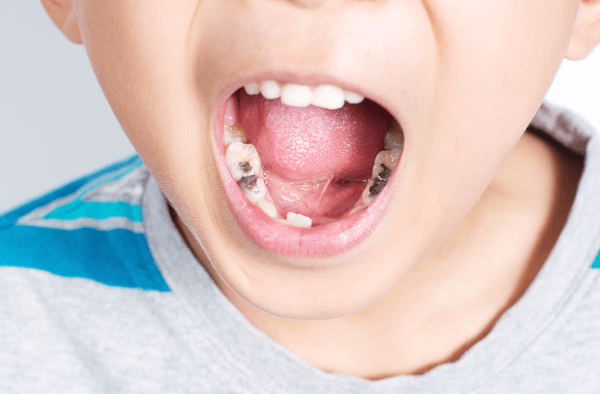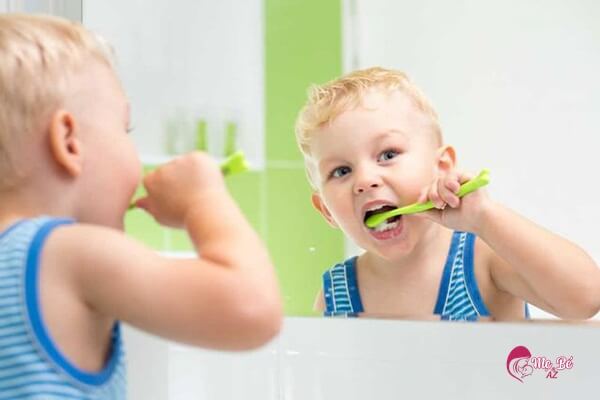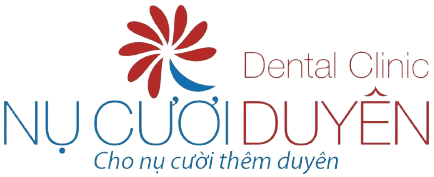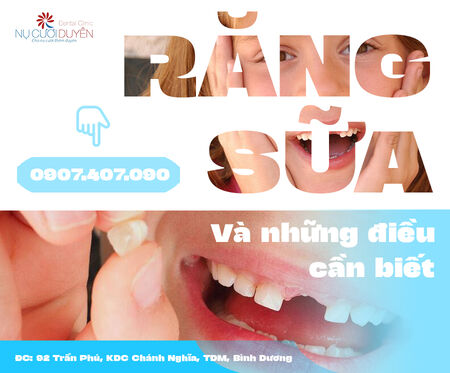The process of replacing baby teeth in children is not only a health-related aspect but also a crucial part of the comprehensive development and confidence of the child. It contributes to creating bright and healthy smiles, marking the beginning of a permanent set of teeth as the child grows. Let’s explore this journey together with Nu Cuoi Duyen Dental Clinic and gain a deeper understanding of the importance of dental care for children during this crucial stage.
The Age of Baby Teeth Replacement in Children

The transition from baby teeth to permanent teeth typically occurs around the ages of 6 to 7. However, each child may experience tooth replacement at different times due to individual factors. The replacement process usually starts with the upper and lower front teeth, followed by the adjacent ones.
In some cases, baby teeth may start falling out before the age of 6, and the replacement process may extend over a period. The natural process of tooth replacement is usually painless unless there are specific issues.
Why Dental Care for Children is Important During Tooth Replacement
Taking care of a child’s teeth from a young age has significant benefits for tooth replacement and gum health, including:
1. Preventing Cavities: Early dental care helps remove plaque and bacteria, reducing the risk of cavities in children. Healthy baby teeth set the stage for the development of permanent teeth.

2. Preventing Gum Issues: Regular tooth brushing and gum cleaning from a young age help prevent gum problems such as inflammation and bleeding.
3. Establishing Tooth Care Habits: Initiating dental care early helps establish daily tooth care habits, becoming a natural part of a child’s life as they grow up.

4. Reducing Tooth Pain during Replacement: Regular tooth brushing keeps the gums soft and minimizes pain when baby teeth start to fall out, facilitating the eruption of permanent teeth.
5. Enhancing Gum Health: Cleaning the gums early on enhances gum health, a crucial factor for maintaining overall permanent tooth health later on.
6. Preventing Tooth Misalignment and Loss of Space: CEarly dental care can help maintain space for permanent teeth, preventing issues like tooth misalignment and loss of space.
Cultivating dental care habits from infancy yields long-term benefits and contributes to the overall development of a child’s dental system.
Foods Beneficial for Teeth and Baby Tooth Replacement
The process of baby tooth replacement requires a healthy diet to support the development of new permanent teeth. Here are some foods that can support this process:
1. Calcium-Rich Foods: Calcium is crucial for building and protecting teeth. Foods rich in calcium, such as milk, soy milk, and low-calcium milk, provide the necessary calcium for tooth development.
2. Vitamin D-Rich Foods: Vitamin D aids in the efficient absorption of calcium. Foods like salmon, fatty fish, and eggs are good sources of vitamin D.
3. Phosphorus-Rich Foods: Phosphorus is another essential mineral for tooth development and protection. Foods such as poultry, fish, soybeans, flaxseeds, and black sesame seeds are rich in phosphorus.
4. Vitamin K-Rich Foods: Vitamin K helps strengthen bones and may contribute to tooth development. Green leafy vegetables such as kale, spinach, and broccoli are good sources of vitamin K.
5. Blackberry and Fresh Fruits: Fruits rich in vitamin C can enhance gum health and prevent inflammation. Blackberries and various fresh fruits are good choices.
6. Green Vegetables: Green vegetables are rich in vitamin A, essential for gum and oral mucosa health. Vegetables like tomatoes, carrots, and pumpkin are excellent options.

Additionally, limit the consumption of sugary foods and drinks, as they can increase the risk of cavities. Ensuring that a child maintains a balanced diet and healthy eating habits supports the baby tooth replacement process.
>> Xem thêm: Tại sao răng nhạy cảm? 5 Nguyên nhân và cách khắc phục
Harmful Habits of Children During Baby Tooth Replacement
Certain habits of children can be detrimental to the baby tooth replacement process and gum health. Some common habits to be mindful of include:
1. Pacifier-Sucking: Continuing to use a pacifier beyond the age of 3 can affect dental development, particularly if the habit persists and leads to dental deformities.

2. Finger-Sucking: Similar to pacifier use, the habit of finger-sucking can impact tooth replacement and dental alignment.
3. Chewing Acidic Foods: Foods containing acid, such as sour candies, can damage tooth enamel, cause gum swelling, weaken teeth, and reduce mineral content in tooth enamel.
4. Biting on Hard Toys: Biting on hard toys, especially when teeth are erupting, can injure the gums and weaken teeth.
5. Engaging in Activities Leading to Tooth Injuries: Activities such as biking without a helmet or participating in sports without tooth protection can result in tooth injuries.
How to Ensure the Best Baby Tooth Replacement for Your Child?
To ensure that your child’s baby teeth are replaced evenly and beautifully, follow these steps:
Early Dental Care: Start caring for your child’s teeth as soon as the first tooth erupts. Use a damp cloth to clean the gums and teeth daily.

Dental Floss: When baby teeth are fully grown, parents can begin using dental floss for children to clean their teeth daily. Starting this practice early helps the child become familiar with the tooth care routine.
Healthy Diet: Ensure your child receives sufficient calcium and vitamin D, essential for building strong teeth and bones. Limit sugar and sweet foods to prevent the growth of bacteria causing cavities.
Limit Baby Bottle Use: Reduce the use of a bottle, as prolonged bottle use may lead to tooth deformities. Encourage the use of a cup as the child grows.
Avoid Chewing Sweet Foods: Discourage the habit of chewing sweet foods for an extended period, as it may lead to cavities.
The process of baby tooth replacement is a crucial step in a child’s development, marking a milestone from early childhood to adolescence. This process signifies not only the maturation of the dental system but also brings about changes in gum health and the overall development of the child.
For more detailed information, please contact:
Hotline: 0834.122.312
(or) Visit our Facebook page


